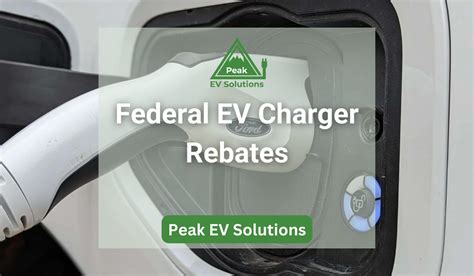As electric vehicles (EVs) gain traction in the automotive market, concerns related to charging infrastructure are becoming increasingly relevant. However, the federal government is stepping in to alleviate some of these worries with rebate programs aimed at promoting EV adoption. One such initiative is the federal EV charger rebate program, designed to make the installation of EV chargers more accessible and affordable for both individuals and businesses. In this article, we will explore how this rebate program works, its benefits, and how it can save you money.
Understanding the Federal EV Charger Rebate Program
The Federal EV Charger Rebate program is part of a broader initiative to transition towards sustainable energy and reduce greenhouse gas emissions. Administered through various federal programs, the rebate offers financial incentives for the purchase and installation of EV chargers. Depending on your circumstances, you could receive a rebate for both residential and commercial charging stations.
Who is Eligible for the Rebate?
Eligibility for the rebate can depend on several factors, including:
- Type of charger: The rebate typically applies to Level 2 chargers, which are suitable for home and commercial use.
- Location: Different states may have specific programs in conjunction with the federal initiative.
- Ownership: The program offers rebates to both homeowners and businesses alike, making it versatile.
How Much Money Can You Save?
The rebates can significantly reduce the costs associated with charging station installation. Typically, homeowners can expect to save anywhere from 30% to 50% on the total cost, depending on the charger and installation expenses. For businesses, the savings can be even more substantial, as many larger installations qualify for higher rebate amounts.
Steps to Apply for the Rebate
- Research: Investigate the types of EV chargers available and identify which models qualify for the rebate.
- Installation: Hire a licensed electrician to ensure that your EV charger is installed safely and efficiently.
- Documentation: Keep all relevant receipts and documents handy, including proof of purchase and installation.
- Application: Complete the rebate application, which is available through federal or state energy departments. Submit your documentation along with the application.
- Receive Your Rebate: After processing your application, you will receive your rebate via check or direct deposit.
Additional Financial Benefits of EV Ownership
In addition to the initial savings from the rebate program, owning an electric vehicle can provide ongoing financial advantages:
- Lower Fuel Costs: Electric vehicles are typically cheaper to fuel than their gasoline counterparts. Charging your EV at home can cost significantly less than filling up a traditional gas tank.
- Maintenance Savings: EVs generally require less maintenance since they have fewer moving parts. This can translate to lower repair costs over the life of the vehicle.
- Tax Incentives: Beyond the charger rebate, electric vehicle owners may also be eligible for federal and state tax credits, further offsetting their total investment.
The Environmental Impact
Switching to electric vehicles not only coalesce with economic benefits but also aligns with environmental sustainability goals. By reducing dependency on fossil fuels, EVs help lower greenhouse gas emissions and promote cleaner air quality. The federal EV charger rebate is a pivotal contribution towards a greener future, encouraging both individual responsibility and collective action against climate change.
Conclusion
The federal EV charger rebate program represents a significant opportunity for both individuals and businesses to reduce their costs while contributing to a sustainable future. By taking advantage of this rebate, you’ll not only save money on your EV charger installation but also enjoy ongoing savings on fuel and maintenance. The transition to electric vehicles is not just an environmental imperative—it’s also an economically sound decision for the budget-conscious consumer. So why wait? Charge ahead and embrace the future of transportation today!
FAQs
1. How do I apply for the federal EV charger rebate?
You can apply by researching eligible chargers, having them installed by a licensed electrician, and filling out the rebate application alongside necessary documentation like receipts and proof of installation.
2. What types of EV chargers are eligible for the rebate?
Typically, Level 2 chargers are eligible for the rebate, but it is advisable to confirm specific requirements through state or federal program guidelines.
3. How much can I save through the rebate program?
Homeowners can expect savings of between 30% and 50% on installation costs, while businesses may receive even higher rebates depending on the scale of their installations.
4. Are there additional incentives for owning an EV?
Yes, beyond the EV charger rebate, owners may also qualify for various federal and state tax credits and benefits, as well as ongoing savings in fuel and maintenance costs.
5. Is there a deadline for applying for the rebate?
Deadlines may vary based on state-specific programs and funding availability, so it’s best to check with your local energy department for the most accurate information.
Download Federal Ev Charger Rebate
